Taliban Calls On Iran For Help Amid Challenges Faced By Immigrants
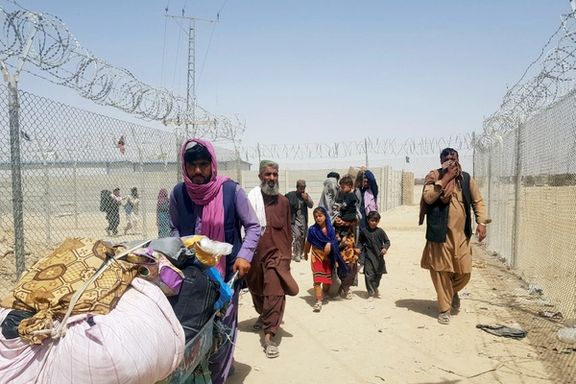
In the midst of challenges posed by millions of Afghan immigrants residing in Iran, the Afghan embassy has sought assistance from Iran to improve their living conditions.

In the midst of challenges posed by millions of Afghan immigrants residing in Iran, the Afghan embassy has sought assistance from Iran to improve their living conditions.
During a recent meeting with Abdul Basit Emami, the Acting Head of Migrant Affairs at the Afghan Embassy in Tehran, Taliban officials expressed concerns about Iranian policies. They raised issues regarding restrictions imposed on Afghan citizens in certain provinces, highlighting the prohibition of employment opportunities, such as roles as sellers or apprentices.
Mohammad Hosseini, the representative of Bushehr in the Supreme Council of Provinces, quoting Solat Mortazavi, the Minister of Labor, emphasized that “five million jobs in Iran are currently monopolized by Afghan citizens,” a point of contention for those who argue Iranians should be employed amidst a national depression.
The figure is particularly significant considering the reported 8.4 million Afghan nationals residing in various provinces. Despite the high unemployment rate in Iran, experts argue that there is no imperative need for foreign labor at the present rate.meanwhile professions such as nursing and teaching remain in dire short supply as Iranians migrant in unprecedented numbers.
In the meeting, Taliban officials underscored the importance of facilitating the issuance of driver's licenses for migrants and establishing a suitable mechanism for legal matters related to property ownership. They urged Iran to prevent the forced expulsion of migrants possessing legal documents and residence permits. However, reports suggest that the number of migrants with legal residence permits in Iran is relatively low.
The Iranian government is currently facing criticism for what some perceive as a lenient approach towards Afghan refugees. Political opponents of the government have repeatedly warned against its "open borders" policy, raising concerns about potential hidden agendas such as rallying more pro-regime support. In response, the government has accused critics of promoting "Afghan-phobia".
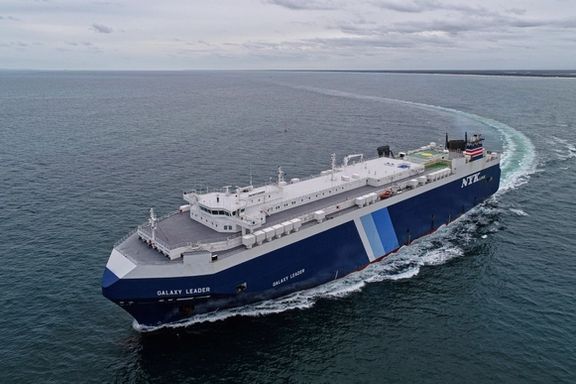
Japan’s government said it was “directly approaching” Yemen’s Iran-backed Houthis after they hijacked a Japanese-operated cargo ship in the Red Sea.
The hijack on Sunday saw dozens of crew on board taken hostage on the Galaxy Leader, a Bahamian flagged vessel.
The car carrier, Galaxy Leader, was taken to a Yemeni port and according to The Telegraph, the proxy group believed it was owned by an Israeli businessman, but on Monday, Japanese officials confirmed the vessel was operated by Tokyo-based firm Nippon Yusen.
Japan’s foreign minister, Yoko Kamikawa, said Japan “strongly condemns” the ship’s hijacking as it worked on its release. “We are also urging Saudi Arabia, Oman, Iran and other countries concerned to strongly urge the Houthis for the early release of the vessel and crew members,” he said.
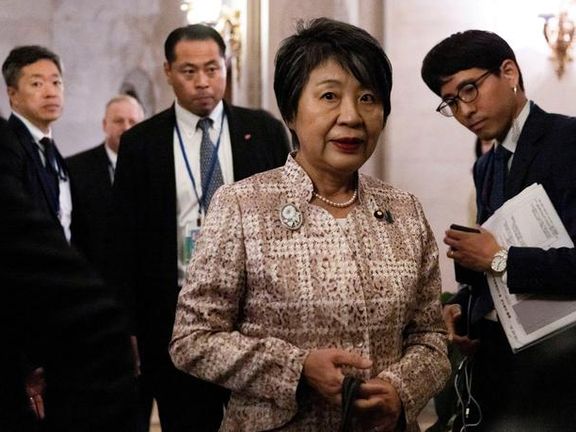
More than 20 crew members are believed to be on the ship including Ukrainian, Bulgarian, Filipino, Mexican and Romanian nationals. The vessel had been heading toward India from Europe with no cargo, Nippon Yusen said. The company said it had set up a crisis management centre at its offices in Tokyo.
Benjamin Netanyahu, the Israeli prime minister, was quick to blame Iran for the hijacking. There were no Israelis aboard the ship and Israel was not involved in its ownership or operation, his office said on Sunday.
“This is another Iranian act of terrorism that represents an escalation in Iran’s belligerence against the citizens of the free world, with concomitant international ramifications vis-a-vis the security of global shipping routes,” his office said.
The link to Israel is believed to have come from its Isle of Man-headquartered parent company, Ray Car Carriers Ltd, which is reportedly a unit of Tel Aviv-incorporated Ray Shipping.
Ray Car Carriers, which operates a fleet of 65 vehicle carriers, was founded by Abraham “Rami” Ungar, one of the wealthiest businessmen in Israel.
On Sunday, amidst the war in Gaza following Iran-backed Hamas’s attacks on Israel on October 7, the Houthis had warned that all ships owned or operated by Israeli companies, or carrying the Israeli flag, could be targeted in the Red Sea and the Bab el-Mandeb Strait.
The Houthis are one of several Iranian proxies to have joined the war on Israel across its borders, attacks having been launched from Lebanon, Syria and Iraq, in addition to the ongoing barrage from Hamas.
While the people in the Gaza Strip are entering a devastating humanitarian crisis following Israel’s relentless retaliation for an attack which was the single most deadly day for Jews since the Holocaust, the proxy militia has had no let-up in its rocket salvos to Israel.
The Houthis have been launching long-range missile and drone salvoes at Israel since the war broke out, leaders in Iran hailing what they say is the imminent downfall of ‘the Zionist entity’.
Mohammed Abdul-Salam, the Houthis’ spokesman, said Israel only understands “the language of force”, adding, “The detention of the Israeli ship is a practical step that proves the seriousness of the Yemeni armed forces in waging the sea battle, regardless of its costs”, he said. “This is the beginning.”
Meanwhile, the US national security council called the attack a “flagrant violation of international law", demanding the release of the ship and its crew, warning it will take appropriate next steps with its allies and UN partners.
The US was unequivocal in its support for Israel’s right to defend itself after October 7 saw at least 1,200 mostly civilians murdered and 240 taken hostage to Gaza.
It has since sent battleships to the region in a bid to prevent escalation but as a result of its support for Israel, has had over 40 attacks on its facilities in Syria and Iraq amidst a worsening regional crisis.
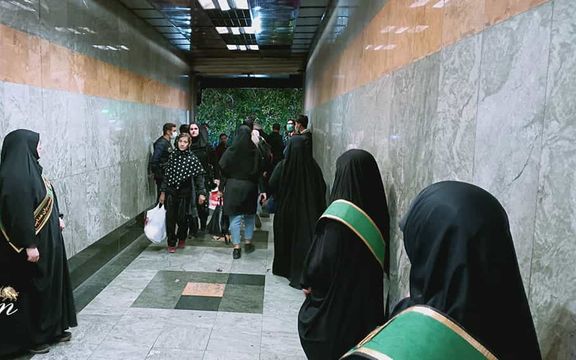
Political activist Abbas Abdi has slammed the recent deployment of police and hijab patrols in Tehran's metro stations, aiming to enforce mandatory hijab regulations.
In a Monday editorial for Etemad newspaper, the reputable reformist commentator and journalist expressed deep concern over the situation, asserting that “the increased police presence in the metro only serves to heighten public discontent.”
In recent months the regime has hardened its stance over the hijab as the strength of rebellion fails to weaken.
Abdi emphasized that the onus is on the government to align itself with the expectations of the people and work towards a more harmonious coexistence. Images circulating on social media depict numerous hijab officers creating congestion in a subway passageway at Tehran's Enghelab station, now colloquially referred to as the "horror tunnel" for women.
Reports also highlight the use of cameras by the Security Police (FARAJA) to identify women without headscarves. Abdi reposted an image of the hijab enforcers on the X social network on Friday, cautioning that the regime would likely face regrettable consequences for its decisions.
The stringent enforcement of hijab rules gained momentum following the tragic death of Iranian-Kurdish woman Mahsa Amini in hijab police custody in September 2022, igniting the Women, Life, Freedom protests. In May, Tehran Mayor Alireza Zakani announced the implementation of a uniformed security unit to prevent women from accessing metro ticket gates.
Reports in August suggested that Tehran municipality was planning to deploy 400 personnel to enforce hijab laws at subway stations in the capital. The heightened presence of hijab police also led to the death of Armita Geravand, 16, who lost her life in October following an encounter with Tehran's hijab police in the subway, in echoes of the Mahsa Amini tragedy one year earlier.

Iran’s foreign ministry on Monday denied Israeli claims that Tehran was involved in the seizure of a British-owned and Japanese-operated cargo ship in the Red Sea by Yemen's Houthis.
"We have said multiple times that resistance groups in the region act independently and spontaneously based on their interests and that of their people," foreign ministry's spokesman Naser Kanaani said at a press briefing. He added that Israeli claims were aimed at diverting attention away from Israeli's "irreparable defeat" in its battle against Hamas militants in the Gaza Strip.
The Israeli Prime Minister's Office issued a statement after the hijacking, calling it "an act of Iranian terrorism that expresses a leap in their aggression", asserting that "no Israelis were present on the ship and the ship is owned by a British company operated by a Japanese company."
"This is another Iranian act of terrorism that represents an escalation in Iran's belligerence against the citizens of the free world, with concomitant international ramifications vis-a-vis the security of global shipping routes."
The alleged Houthi attack comes after calls by Iran’s leader Ali Khamenei to ban shipment of oil and food to Israel. His call was repeated by his ultra-hardliner loyalists such as Hossein Shariatmadari, who runs the Kayhan Daily newspaper in Tehran.
The hijacked ship is Galaxy Leader, registered under a British company, which is partially owned by Israeli tycoon Abraham Ungar who goes by Rami. He is the founder of Ray Shipping Ltd., and is known as one of the richest men in Israel. The vessel was leased out to a Japanese company at the time of the hijacking.
The Houthis, an ally of Tehran, have been launching long-range missile and drone salvoes at Israel in solidarity with the Palestinian Hamas militants fighting in Gaza.
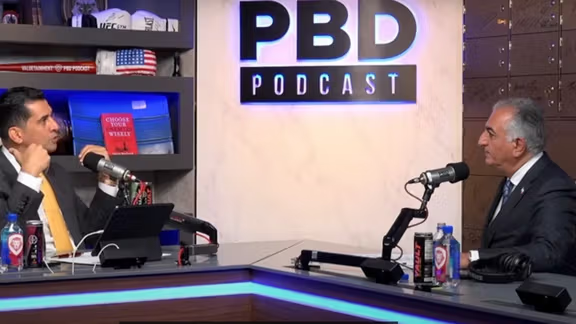
Iran’s exiled prince Reza Pahlavi has revealed that his father Mohammad-Reza planned to pass the throne to him just before the monarchy fell in the 1979 revolution.
In a three-hour interview with entrepreneur and best-selling author Patrick Bet-David -- himself of Iranian Assyrian and Armenian origin -- Pahlavi said when his father, the last shah of Iran, knew about his cancer he wanted his son to succeed to the throne but his aspiration was eclipsed by the emergence of a leftist-religious revolution that altered the course of Iran’s history.
The former crown prince, who has long campaigned for a secular and democratic Iran rather than a restoration of the monarchy, has a large fan base in Iran and abroad. During the Women, Life, Freedom protests – ignited by the death in custody of 22-year-old Mahsa Amini in September 2022 -- Pahlavi became a leading opposition figure, but he has critics among other dissident activists who do not see him as the leader of the opposition.
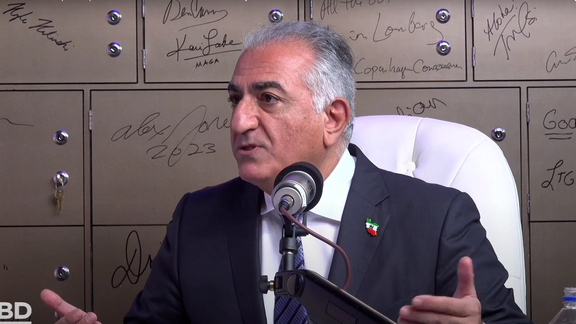
Despite at least four decades of Islamic Republic propaganda to indoctrinate Iranian children and youth against the Pahlavis, Iran’s last dynasty is still revered among Iranians, who chant slogans to honor the two Pahlavi kings who reigned in the 20th century during gatherings and rallies. Reza Pahlavi enjoys support thanks to his hereditary gift, among middle aged and older Iranians, but also he is popular among the Mahsa Generation Z youth, who see him touring the world to make the voices of Iranians heard and talking about transitioning from the Islamic Republic.
Asked about if he would consider running for a position in Iran after the collapse of the Islamic Republic regime, Pahlavi emphasized that the Iranian people are the ones who should decide on the future form of the government. “In order for people to be empowered, they have to have more than hope. They have to actually believe that it can be done. I believe that it can be done.”
He argued that most Iranians share Western values and the Islamic Republic is the obstacle on Iran’s path to connect to the global community. “We (Iranians) are your allies in principle” as a democracy seeking country. He asserted, “how many democracies do you know that go to war against one another?” He argued that Iran after the Islamic Republic is a country that the world can count on as a flagbearer of peace rather than an instigator of conflicts.
Questioned by Bet-David about how he sees the colossal challenge of overthrowing clerical rule, Pahlavi said, “There was a time I didn’t think that I would possibly see the fall of the Berlin Wall in my lifetime.”
The interview was the first time Pahlavi defended some of the policies of his father, tacitly trying to vindicate the last monarch and his notorious intelligence agency SAVAK. The secret police, domestic security and intelligence service, operated from 1957 until prime minister Shapour Bakhtiar ordered its dissolution during the climax of the 1979 Iranian Revolution. Pahlavi argued that many of the prisoners held by SAVAK were among thousands of Soviet KGB agents active in Iran. He charged that Iran’s current ruler Ali Khamenei was among such prisoners who had undergone training under KGB in Palestinian camp in Lebanon.
Pahlavi also talked about how the US government at the time helped the Islamic revolutionaries topple his father while Bet-David showed a video of a debate in which former US President Ronald Reagan criticized Jimmy Carter for undercutting Mohammad-Reza Shah Pahlavi. The prince also talked about his meeting with Carter and his National Security Advisor Zbigniew Brzezinski in 1978 at the White House. According to Pahlavi, the US politicians believed the establishment of an Islamic government in Tehran can stop the spread of Communism in the region.
Asked about why Iranians revolted against his father, he said the country was progressing toward a modern era “too fast,” explaining that the advances were rejected by the clergy who were conservative about any change in the social structure of Iran. “All of a sudden you find a country, where the income per capita jumps to the level it was, and people’s purchasing power made them capable of having so much more... and then you have the resistance coming from the clergy who never liked where my father was taking the country.”
Now Iranians have the lowest purchasing power unprecedented in history while women and minorities are persecuted,and Iran is far from the goals of Iran’s monarchs who believed the country would take its place among the top five countries of the world.
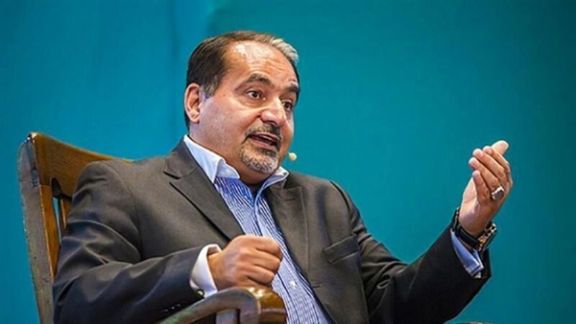
A House Committee has initiated an inquiry into the role of Hossein Mousavian at Princeton University, suspecting him of advancing Iran's interests.
The House Committee of Education and the Workforce is probing the Pro-Tehran pundit who served as a key figure in Iran’s nuclear negotiations with the international community until 2005. He is currently a Middle East Security and Nuclear Policy Specialist at the Program on Science and Global Security at Princeton.
Twelve Republican committee members have expressed concerns about Mousavian's influence on campus, citing his participation in Qassem Soleimani's funeral and an appearance on Iranian TV. Mousavian denies the allegations.
The investigation aims to assess potential threats to national security and underscores broader worries about malign influences infiltrating US education.
Representative Virginia Foxx has emphasized the 15-year tenure of Mousavian at Princeton as a troubling instance of individuals associated with hostile regimes within US education.
Notably, the revelation that STRATCOM hosted Mousavian as a speaker in August 2023 has raised concerns among House Committee members and the Armed Services Committees. Mousavian clarified that his talk at STRATCOM focused on peace in the Middle East.
Despite a recent declassified US intelligence report asserting that Iran is not currently engaged in key nuclear weapons activities, European reports from 2023 suggest the presence of an active atomic weapons program. Princeton University has yet to respond to inquiries regarding the investigation.